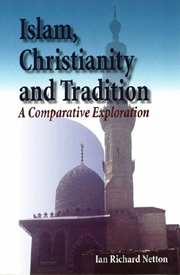3 - THE FLIGHT TO TRADITION: A PARADIGM OF RETURN AND DENIAL
Published online by Cambridge University Press: 12 September 2012
Summary
Christian Tradition: Definitions and Distinctions
Lexically the word ‘tradition’ has several facets. The Concise Oxford Dictionary of Current English provides four fundamental definitions:
Opinion or belief or custom handed down; handing down of these, from ancestors to posterity esp. orally or by practice.
(Theol.) Doctrine etc. supposed to have divine authority but not committed to writing, esp. (1) laws held by Pharisees to have been delivered by God to Moses, (2) oral teaching of Christ and Apostles not recorded in writing by immediate disciples, (3) words and deeds of Muhammad not in Koran.
Artistic or literary principle(s) based on accumulated experience or continuous usage …
(Law). Formal delivery.
Etymologically, the word ‘tradition’ derives from the Latin trado–tradere–tradidi–traditum meaning ‘to hand over, give up, surrender’ in the sense of ‘to hand down as any kind of inheritance to posterity’.
Theologically, tradition may embrace in Christianity both the practice of the faith as well as the faith itself, including scripture; or, more narrowly, ‘tradition may be distinguished from scripture, and taken to mean the teaching and practice of the church, not explicitly recorded in the words of the Bible, but handed down from the beginning within the Christian community’.
More mystically and eschatologically, Kallistos Ware has observed:
While Tradition is indeed the dynamic movement of God in history, it is to be seen also in a metahistorical or eschatological perspective. It is not so much a long line stretched out in time as the gathering of time itself into God's eternity, the irruption into this present age of the eschaton, or age to come.
- Type
- Chapter
- Information
- Islam, Christianity and TraditionA Comparative Exploration, pp. 106 - 146Publisher: Edinburgh University PressPrint publication year: 2006



